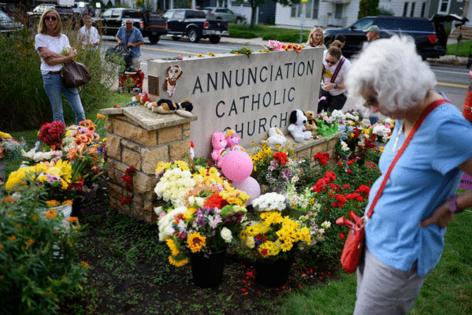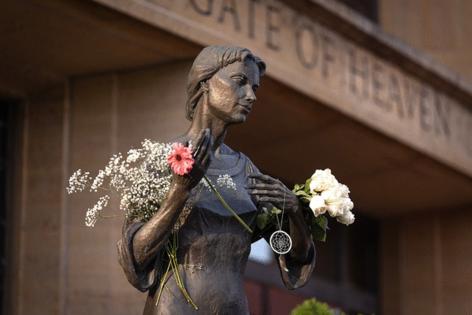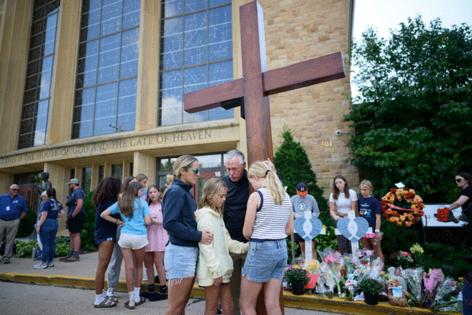Shattered by violence, Minneapolis church draws on its history of resilience
Published in News & Features
MINNEAPOLIS — For more than 100 years, Annunciation Church and its stately red-brick school have been an anchor of its leafy pocket of south Minneapolis. Students in green and blue uniforms, many from the surrounding neighborhoods, walk to the school like generations before them, passing by the powerful inscription carved above the front doors of the parish church: “This is the house of God and the gate of Heaven.”
On Wednesday, the close-knit community that prides itself on service and academic excellence became known to the world for something far darker. A shooter fired a spray of bullets into the church during morning Mass, killing two school children and wounding 18 others.
Compounding the tragedy is the shooter’s ties to the community. Robin Westman, who authorities say unleashed over 100 rounds into the church before dying of a self-inflicted gunshot wound, attended the school in 2017, a yearbook photo shows. Westman’s mother, Mary Grace Westman, worked at the church as a parish secretary, according to a 2021 Facebook post.
Many in the Annunciation community describe it as a safe haven, yet the church has never been sheltered from the outside world. Like many Catholic communities, it has wrestled with debates over church teaching on homosexuality, marriage and divorce.
Still, alumni and church members say it has remained steadfast, a place where people rally around sick parents and life-long friendships bloom.
“It’s a bit like a small town in the middle of the city,” said Kelly Molloy, who attended the school from first through eighth grade in the 1990s and early 2000s. “For one institution, it had the biggest possible effect on me as a person.”
A community pillar
Annunciation Church held its first Mass in 1922. The next year, four Dominican Sisters opened the 72-pupil school that would become a permanent fixture in the quiet neighborhood southeast of Lake Harriet. The church’s name refers to the angel Gabriel’s announcement to the Virgin Mary that she will divinely bear a son.
By the 1960s, Annunciation Catholic School had grown to enroll more 1,000 students before class sizes began shrinking — a trend that affected Catholic schools across the U.S.
But while other schools have closed, Annunciation remains. Its enrollment has hovered around 350 over the last decade, and the number of children attending the school ticked up after the pandemic.
Tuition rates vary based on parish membership and the number of children enrolled. For parish families in 2025-26, tuition is nearly $7,000 for the first child enrolled, according to the school website. The cost goes down significantly for each additional child enrolled and financial aid is available.
Annunciation also has held fast while the broader local Catholic community has dealt with declines in the faithful. In 2012, when the Twin Cities archdiocese reduced its number of parishes amid budget troubles and a priest shortage, Annunciation absorbed another church — a testament to its healthy membership.
Today, about 1,000 to 1,500 families belong to the church, Parish Council Member Kevin McMahon said.
McMahon, whose five children attended Annunciation, said the influence of the Dominican nuns who decades ago ran the school remains strong.
Love, kindness and care for the poor are paramount to Annunciation’s teachings. The church boasts a strong youth ministry program and funds a school and elder care in Haiti. Parishioners point with pride to Mary Jo Copeland, a former student whose Minneapolis-based nonprofit has helped thousands of homeless and low-income families.
“Social teachings have always been a very important element here,” McMahon said.
Long-time parishioner Stephen Seitz said Annunciation is a sturdy neighborhood church blessed with a school that keeps attracting new families.
“The biggest thing about this parish is that it’s truly a neighborhood parish,” Seitz said. The surrounding neighborhood is predominantly white, family-oriented and wealthy, Census data shows.
For many former students, what comes to mind first about the school is not religion but relationships. Malaika Jadba has remained close with friends from her 2002 graduating class, many of whom are now raising money for the school after the shooting.
“It’s a tight-knit community, one with lasting friendships that go into adulthood,” she said. “We feel very, very proud of our school and its history.”
Leadership changes
The school, like other Catholic institutions nationwide, has had to navigate its place in a changing world.
One test came in 2015, when Rev. Brian Park became parish priest and leaned into certain Catholic teachings that troubled some parents, several told the Minnesota Star Tribune. Those stances on same-sex marriage and divorce aligned with the church, but parents say his style wasn’t a good fit for a community committed to inclusivity.
Tensions spiked in 2019, when Park reprimanded a teacher for showing fifth-graders a video about refugees, income inequality and discrimination that mentioned a relationship between two women, the Southwest Journal reported at the time. Some parents supported the administration, but others took issue with Park’s views of homosexuality.
Later that year, a group of 45 parents presented a statement to the school advisory council expressing concerns about inclusiveness, according to minutes from a council meeting. Among their worries: an intolerance of different theological viewpoints and an increase in religious instruction in schools.
Park left Annunciation in 2020 for a St. Michael church, and parents say tensions within the school dissipated after his departure.
In a statement to the Star Tribune, Park didn’t answer questions about the episode but said he has many “fond memories” of the school.
“My heart breaks for the families of Harper and Fletcher, the wounded students and parishioners, and the whole Annunciation community,” he said.
McMahon, the parish council member, said priests who have leaned left, right and “everything in between” have led the church over the years. He said he hardly ever misses Sunday Mass with his family, and he’s never heard a priest at Annunciation express any sort of intolerance for any group of people.
“If I did, I would gather my kids and walk right out of church,’’ he said.
Like most Catholic congregations under diocesan control, Annunciation receives new leadership on a rotating basis. Since 2015, five different priests have served as pastor at the church and school.
‘A neighborhood community’
Annunciation’s wide reach was apparent at a Wednesday night vigil that drew thousands of mourners to a Richfield Catholic school.
Among the crowd was Tim Pixley, a Minneapolis firefighter still reeling after rushing to the shooting that morning. Pixley, a third-generation resident of the south Minneapolis neighborhood where Annunciation sits, said the church’s influence looms large, even for non-members like himself.
“Many of my coworkers’ and friends’ kids go to that school,” he said. “It’s a great neighborhood community.”
The shooting, Pixley said, is a turning point — a tragedy that marks a before and an after for the close-knit area.
“It’s totally changed,” he said.
On Thursday morning, mourners placed flowers and stuffed animals outside a campus that, for many, evokes a trove of memories.
It’s where students thrive in a rigorous International Baccalaureate program and parents devote countless hours to volunteering. It’s where wiffleball is a tradition, and an annual fall gathering brings the community together for food, fun and games.
And it’s where, on this August day, families gazed in shock at two crosses memorializing the children who died: Fletcher Merkel and Harper Moyski.
Behind them loomed the church, the community standing as it has for a hundred years.
———
(Eleanor Hildebrandt and Greta Kaul of the Minnesota Star Tribune contributed to this report.)
———
©2025 The Minnesota Star Tribune. Visit startribune.com. Distributed by Tribune Content Agency, LLC












Comments